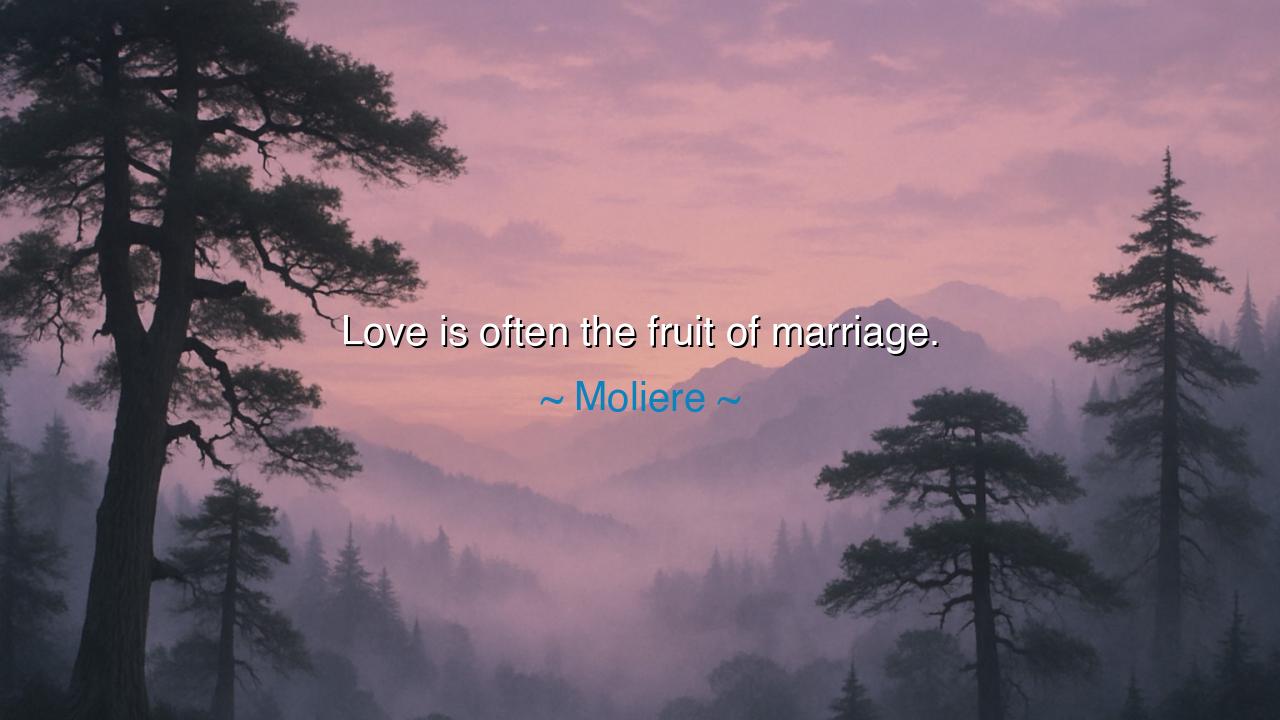
Love is often the fruit of marriage.






“Love is often the fruit of marriage.” Thus spoke Molière, the great French dramatist, whose wit pierced through the vanities of his age and revealed the hidden truths of the human heart. In this short and subtle phrase, he offers a paradox to the modern ear—for many imagine that love must come before marriage, that passion must ignite first and only then lead to union. But Molière, wise in the ways of men and women, understood a deeper rhythm of the soul. He teaches that love, in its most enduring form, is not merely the cause of marriage but often its result—that true affection ripens not in the flush of desire, but in the long and faithful tending of shared life.
To grasp the origin of this thought, we must remember Molière’s time—the seventeenth century, when marriages in Europe were often arranged for position or fortune, not for passion. Many were joined not by hearts but by families, and yet, through the alchemy of time, companionship, and shared labor, something nobler than desire sometimes bloomed: love born of understanding. Molière, through his plays and his life, observed that while passion burns swiftly and dies, the gentle flame of affection can grow even from humble beginnings, if two souls choose patience, humor, and kindness. His wisdom is thus both worldly and spiritual: that marriage, when cultivated with care, can give rise to love far deeper than the fleeting infatuations of youth.
In his own works, Molière often mocked the foolishness of those who mistook infatuation for love. In The School for Wives and The Misanthrope, he portrayed lovers blinded by fantasy, chasing illusions rather than substance. Yet he also showed that love, once tempered by time and trial, becomes something far more durable—a tree with deep roots, rather than a flower that withers in the sun. Thus, when he says “Love is often the fruit of marriage,” he reminds us that the highest forms of affection are earned, not found; they are cultivated, not stumbled upon. Love, he teaches, is the harvest of effort, the reward of constancy.
History, too, bears witness to this truth. Consider the story of King George III and Queen Charlotte of England. Married in 1761, they met for the first time on the very day of their wedding—a union arranged for state, not sentiment. Yet over the years, through loyalty, mutual respect, and shared faith, their marriage blossomed into one of genuine devotion. They raised fifteen children and ruled together for nearly six decades. When madness darkened the king’s mind, the queen’s love did not fade; she remained by his side in sorrow as she had in joy. Here was love not born of romance, but of duty transformed into affection, of two lives intertwined through time’s slow grace. Their story gives flesh to Molière’s wisdom: that sometimes love is not the spark that begins the journey, but the flame that endures to its end.
There is a deeper philosophy in this saying as well. Love, when born within marriage, is a love purified by reality. It is not the idealized affection of poets, nor the feverish longing of youth, but a steady warmth that grows through the shared trials of life—through sickness and health, through laughter and hardship. It is the kind of love that knows the other’s flaws and yet remains; that forgives, adapts, and endures. Molière saw that such love is the more miraculous, for it rises not from fantasy, but from the soil of daily living. It is, as he said, a fruit—which means it must be cultivated, watered, and given time to ripen.
Yet his wisdom carries a gentle warning: not all marriages bear this fruit. For love grows only where hearts are open and humble. Where pride, bitterness, or neglect take root, affection withers before it can bloom. Thus, Molière reminds us that marriage is not the end of love’s journey, but the beginning of its labor. To marry is to plant a seed; to love, truly and enduringly, is to tend it each day—with laughter, with patience, with mercy. Those who expect the harvest without the toil are doomed to disappointment, but those who give of themselves freely will find that love, like fruit upon the branch, comes in its season, sweet and abundant.
So, my listener, take this teaching as counsel for your own life. Do not despair if passion fades, or if love seems distant in the early years of union. Instead, work the soil of your marriage with kindness and honesty. Speak gently, forgive swiftly, and nurture the bond that time alone can strengthen. Love, Molière tells us, is not a fire that burns before the altar—it is the warmth that remains long after the ceremony has ended.
And thus, the old playwright’s wisdom stands eternal: “Love is often the fruit of marriage.” It is not a mystery to be discovered, but a masterpiece to be made. It is proof that the deepest joys are not those seized in haste, but those patiently grown through faith, humility, and care. For in the end, the truest love is not the one that begins in passion—but the one that endures, matures, and finally, bears the sweet and lasting fruit of a shared life well lived.






AAdministratorAdministrator
Welcome, honored guests. Please leave a comment, we will respond soon